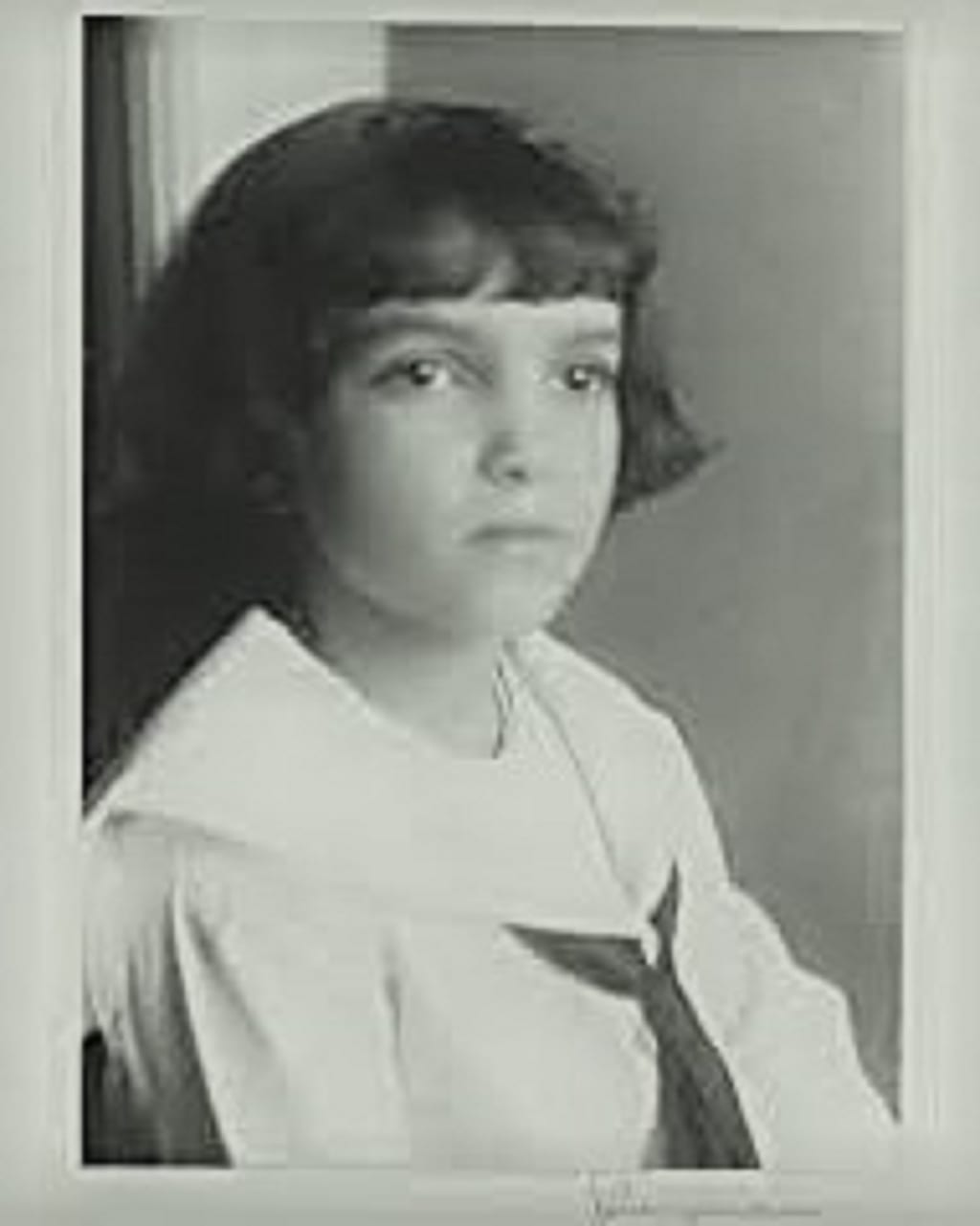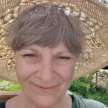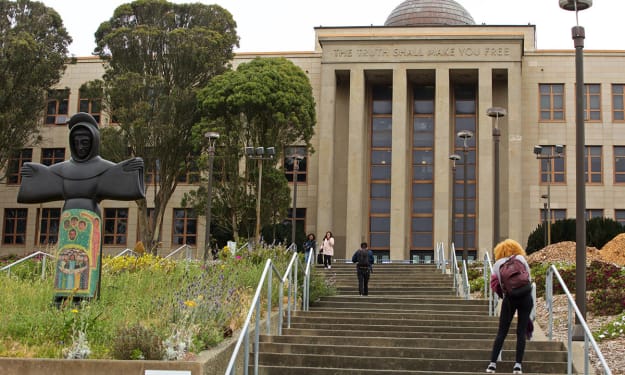My Mother Jeanne: Woman of the 20th Century
An Interesting Life

My Mother Jeanne: Woman of the 20th Century
A Vignette
My mother was born in 1918, year of the deadly Spanish Flu, and the year World War I ended.
She grew up in a small New Jersey town called New Milford. She and her three older siblings lived with their parents in an old dairy building converted into a house.
The house was a lovely, long whitewashed brick building with shuttered windows along the side. I never went in the house because by the time I went to New Milford with Mom at the age of twelve, her sister would not allow us in.
Mom described her childhood as happy. She loved school, where she learned to play the trumpet. A long lost picture of her shows a spunky girl with thick brown bangs wearing a white dress belted around her hips blowing her trumpet with her stomach sticking out. Very cute.
As very a young girl, Mom’s boyfriend was name Hughy Pugh. Her best friend, Thelma, often whispered about what he did in Mom’s ear.
In junior high and high school, my mother worked on the school newspaper and sang in the chorus. She graduated valedictorian of her class.
Mom kept in touch with one of her teachers. I met her when we visited her in El Cerrito, a town just north of Berkeley, California. Emily Light was a slender woman with white hair she wore in a French roll.
Emily’s strong personality could be abrupt. She supported many causes, including the Civil Rights Movement, and she knew Martin Luther King and his wife Coretta, with whom she was a good friend.
She retired from teaching elementary school after a long career. She never married.
Mom’s childhood was disrupted by the tragic death of her father when she was six. After successful surgery for a burst appendix, he healed well until he developed a fever and died. The surgeon had left a dirty bit of packing in his wound.; this caused a septic infection.
After my grandfather died, Mom was confused, in addition to her sadness. In the mornings at school, the students gathered in front of a tall flagpole. They said the Pledge of Allegiance and recited the Lord’s Prayer. Mom thought, “our Father who art in heaven” referred to her father, and that the whole school worshiped him the way she did!
The family was thrown into financial chaos and struggled with money problems all through Mom’s childhood. These were complicated by the Great Depression between 1929 and 1933.
As soon as her older brother, John, was old enough, he got a job driving a commuter bus between Hackensack and New York City. Her eldest sister, Alice, married an alcoholic Irish man and moved to a tenement in the city. They had three children before she left him and returned to the family home with her kids. Mom’s other sister, Kaye, got a job at a dude ranch in Arizona. Sadly, while there she contracted strep throat, and died of scarlet fever.
The only memory Mom ever shared with me of her mother was a time they were in the kitchen and she scolded her harshly. I held this impression into adulthood, that my grandmother was overly strict and emotionally cold.
Years later, I asked Mom how her relationship was with her mother, and she said, “Good.” So, I don’t know. That’s all I know about my grandmother, except that she grew up on a dairy farm in Canada and was the daughter of Irish immigrants.
My mother’s father was an artist and an architect before he died. He met my grandmother at Pratt Institute in New York City, where he taught. She was an art student of his.
My grandfather painted beautiful watercolors. Mom always wished she could learn to paint as well. But she rarely had free time for anything, let alone taking art classes and spending time painting.
The financial straits of Mom’s family prevented her from attending college. Her dream was to become a teacher; instead, she studied nursing in a training hospital in New York City. Unlike modern nurse’s training, Mom’s training was hands on from the get go. Nurses in those days did everything the doctors did not, which included patient hygiene, tasks done by nurse’s aides today.
My mother loved adventure. After nursing school, she sailed from New York to Panama, through the Panama Canal, and north to Los Angeles.
Mom’s petite stature and buxom figure, as well as her intelligence and caring personality attracted my father when he met her at his aunt’s house in Pasadena. He lived with his aunt while finishing his master’s in civil engineering at the California Institute of Technology. Mom was visiting her aunt, a former Presbyterian missionary in Hawaii, who knew my father’s aunt.
Mom was attracted to Dad’s intelligence, quiet manner, and handsomeness. It was not long before they married.
Early on, they began moving frequently. Dad, too, craved adventure, and often took consulting jobs that took him to foreign countries. He also suffered from depression and anxiety, and employed “the geographical cure” to deal with it.
Mom and Dad were a compatible pair, and balanced each other well. Mom’s flexibility, positive outlook, and adaptability were a good counterpoint to Dad’s wanderlust and tendency to become depressed. Dad’s mostly calm nature helped Mom through periods of anxiety and feelings of distressing alienation in relation to her sister in New Jersey.
From the get go, they availed themselves of whatever opportunities came their way to attend concerts, see movies, and visit museums, parks, and other enjoyable places. They took drives and trips. They read and listened to music. They took my sisters and me with them when we came along. Our house was filled with books, operas, and symphonies.
My mother put Dad on a pedestal. She lost her father at a young age. She idealized him; she idealized my father. This was fine, as far as it went, but it adversely affected my sisters and me: our lives revolved around Dad; many times our needs were neglected and sacrificed to Mom’s catering to Dad.
Mom’s focus on Dad led to her allowing him to move us frequently – every year or too, sometimes more often, and always abruptly. This put great strain on us. Being a new kid at school is tough. Leaving friends behind is tough. Readjusting over and over again is exhausting.
Mom’s profession as a Registered Nurse allowed her to find jobs pretty easily, which helped us tide the financial gaps when we moved and Dad was between jobs.
Nursing suited her – that mixture of caring and efficiency. In her work, she had to walk quickly for long distances back and forth in the halls of the hospital. She had the stamina to do it.
Mom was a strong woman. She had resilience, perseverance, intelligence, energy, and adaptability. She counseled us to pull ourselves up by the bootstraps, to do what’s expedient, to sacrifice ourselves for the sake of the family, and Dad in particular. She seemed to have endless tolerance for being uprooted, in contrast to my sisters and me.
Despite her failings, she was overall a good mother. She treated us kindly, gave us guidance, kept us healthy, and amused us with her many comical actions. Once she backed into cadets marching by at West Point! Once she kicked a sea lion, thinking it was dead. Dad and I laughed as it chased her down the beach!
She was a good role model for my sisters and me for keeping calm, rational, and resourceful in emergencies. This has served us well in life.
She was quite artistic and creative. In lieu of painting, she engaged in crafts with us: homemade Christmas decorations, making trivets by embedding objects in resin, and creating jewelry from natural objects – acorns, shells, stones. Once she copied South American designs and painted them on the sides of round cardboard barrels. They came out beautifully.
She also sewed most of our clothes when we were young, and taught us girls how to sew on the machine and by hand.
Mom never became a good cook, however. The only way she used her creativity in the kitchen was to experiment with ingredients. The most dramatic of these experiments was when she bought meat of a South American rodent that was at the market! No one could eat it.
She used to boil tripe for our dogs. My God, how that stunk up the place!
My mother used both her creativity and her nursing background to help my dachshund, Chippie. He began having seizures and lost the use of his hind legs when we lived in Menlo Park when I was sixteen. Dad had a stroke, and the atmosphere at home became very tense and stressful. Chippie seemed to be reacting to that, in part.
The vet said that dachshunds are prone to lower spine degeneration due to the long spines they have, and that the paralysis was related. There was nothing to be done about it.
Within a few months, Mom and I moved to a small seaside town on the central California coast called Cambria. We rented a log cabin perched on a hill overlooking the ocean. Mom took Chippie to the lagoon to swim. Within a few weeks he was not only walking, but running, and climbing all over rock formations and tide pools!
A frustration of Mom’s concerned going to college. Her childhood goal was to become a teacher, but her family needed her to become independent quickly due to finances. She went off to nursing school, but still harbored the wish to become a teacher. She wanted to at least earn a bachelor’s degree.
Once, when I was five, she signed up for a couple of courses at UC Berkeley. Problem was, she had no babysitter. She took me with her a time or two before the professor told her it was too disruptive.
She felt quite intimidated at UC Berkeley. She developed writer’s block. Dad tried to help her with her papers, but he tended to criticize and express impatience. She dropped the courses.
Mom never held onto resentments. I cannot remember a time when she blamed someone else for her problems or would not give someone a second chance.
Mom worked hard. The Protestant ethic lived strongly in her. My sisters and I worked hard, too, but it never seemed hard enough to Mom. She often said, “Don’t you think you should be…(doing something else)?” It made us feel like whatever we were doing was wrong. It made us doubt our judgment. It was confusing and painful.
We were not a religious family, although Mom wished we were. Dad was an atheist, so Mom became a frustrated church goer. Dad did accommodate her many times by consenting to attend various churches of different denominations, but our attendance was short-lived. For one thing, we moved so often it was difficult to join or be very involved in congregations.
Besides, we girls were not very interested. We knew the Lord’s Prayer and “Now I Lay Me Down to Sleep,” that was it.
Because Mom worked, she did not fit in with the housewives of the fifties and sixties, when most women stayed home with their kids. I don’t know how much interest she might have had for coffee klatches and family barbecues, anyway.
At the same time, Dad did not fit on with other fathers: he had little interest in sports; he was intellectual and quiet; he was not about to engage in chit chat. He liked people, and was kind, but had few intimate relationships. The friendships we had as a family were with his colleagues and their families.
My parents revolved around each other, and we, in turn, revolved around them, as we ventured from place to place. Sure, my sisters and I made friends and did things with them, but our relationships depended upon when my parents decided to move next and to where. We never knew ahead of time; we barely had time to say goodbye. One of my sisters said, “We were like satellites revolving around Mom and Dad.” It did feel that way.
Although Mom was friendly toward others, her social skills did not extend to intimate relationships with many people. She seemed a bit afraid of intimacy. Sometimes she came across as insincere when she presented a more cheerful facade than I think she actually felt. This was ironic, because Mom was a very sincere person.
Much of this originated with her self-consciousness about how she looked when she smiled. She felt embarrassed by a gap between her front teeth, so kept her mouth closed when she smiled. She did not keep her smiles long, either. These factors lent to an impression of insincerity.
She felt self-conscious about her stomach, as well. After three Cesarean sections, she could not hold her stomach in. In those days, obstetricians cut through women’s abdominal muscles instead of making a few-inch incision they do now.
As a consequence, Mom wore heavy girdles. She did not seem to mind them, although I would find them hot and restrictive.
One way that Mom kept her distance from others, I think, is that she chose friends and acquaintances who needed help. It was fine when the person was elderly or disabled, but sometimes the person needed help other than Mom’s.
For example, she befriended a woman who lived down the street from us in Palo Alto. The woman’s husband had left her with her two young sons. She was incapable of taking good care of them because she drank heavily and was drunk and abusive.
Mom took it upon herself to save this woman. She intervened in a variety of ways I was too young to remember. Dad counseled her to stop. Finally, he ordered her to stop. The woman’s situation was far beyond anything Mom could help her with unless it was to find her treatment. Maybe Mom did try to do that.
I went to the woman’s house one day. She was stinking drunk. Her boys peeked out from behind a door. I felt so sorry for them.
Mom trained as a psychiatric nurse early on before antipsychotic drugs existed. She worked in many psychiatric hospitals. Patients with severe depression were given electric shock treatments and either psychoanalytic or behavioral therapy. Until antipsychotic drugs came out in the 1950s, patients with schizophrenia were treated with insulin coma therapy, for which they received large daily injections of insulin. Sometimes they were even lobotomized.
Mom misused her psychiatric experience in a traumatic and hurtful way with me. When I got upset or angry with her as a teenager, she sometimes told me I must be schizophrenic. There was no cause for her to say that beyond her discomfort with my emotions.
I found/find it ironic that someone well versed in the symptoms of schizophrenia, and who was usually so caring, could say that to me. It was her fear of negative emotion talking.
Before I was born, my parents and sisters lived on a camp along the Caroni River in Venezuela while Dad and a group of fellow engineers were designing a damn. One day she was distracted by one of my sisters, who was three at the time, as she rang the dinner gong – a big iron pipe that hung down from the roof of a veranda.
Mom was hit in the forehead by that pipe. Shortly afterwards, she began exhibiting bizarre behavior. Dad committed her to a sanitarium in Caracas when it was clear that she had amnesia in addition to the dramatic change in her personality and behavior. She did not recognize Dad for almost two years.
She was given shock treatments, which were successful in treating the severe depression she fell into, as well as her amnesia.
After she was cured, she never exhibited depression or any other kind of mental illness again.
Maybe she just didn’t remember or comprehend her experience in the sanitarium. She did carry concerns that the shock treatments damaged her brain, but was always reassured by doctors that it had not. It seemed to me, though, that she would have more sensitivity than to call someone, especially her daughter, schizophrenic.
Another thing she said that was hurtful and insensitive in response to my emotions was to tell me that my father would kill himself if I let him know my feelings when I felt angry or upset about our moving.
In our family, my sisters and I were discouraged from expressing negative emotions. My mother felt they were dangerous, and Dad did not take well to them.
Everyone experiences negative emotions at times, of course, and free and appropriate expression of them is healthy. Children benefit from knowing that their parents will respond with concern and helpfulness, not censure.
Mom could be tactless or say things that others experienced as off the wall at times. She engaged people by asking a lot of questions, and this did effectively express interest, but sometimes seemed intrusive.
Here’s an example of Mom’s tactlessness. When we women were dressing for my first wedding, my mother handed my friend a pair of rolled up socks and said, “Don’t you think you ought to use these?” In her bra, she meant! Can’t get too much more tactless than that!
On the other hand, she made great efforts to maintain her relationships with her family. She made many overtures to her older sister, from whom she was estranged. The estrangement distressed Mom no end.
The issue concerned my grandfather’s paintings. For many years, Mom’s sister refused to let her have any of them. She would not even allow her to enter their childhood home, which Alice took over when my grandmother died.
Mom might have resorted to hiring an attorney; Alice held no legal right to the paintings. But, my mother would never fight a family member in court; it was against her ethics.
Only years later, did Alice send a few paintings to Mom. She had them framed, and displayed them prominently in our home.
My mother kept contact with her cousin and his wife, and with her nieces, nephews, and great nephew. She wrote letters in her beautiful Palmer Method handwriting. She sent pictures, and occasionally made long distance phone calls to them.
Mom kept in close contact by letter with two girlfriends: Thelma, her childhood friend in New Milford, and Mona, who attended nursing school with her. She rarely traveled across country to visit, but when she did she enjoyed reminiscing with her friends. I met them both on a trip Mom and I took back east when I was twelve. They were extremely nice people, who were clearly fond of Mom.
My mother could appear harsh. Her facial expression generally expressed concentration and focus on some problem or activity. When she scolded us, she could appear overly critical.
One afternoon when I was eleven, some friends and I played in a house under construction. Somehow Mom learned of this and came to get me. She was extremely upset. She never raised her voice, but caught my hand and pulled me away. She told me in no uncertain terms how dangerous being in there was and forbade me from ever doing it again.
It might have been that incident that caused one of my friends to tell me years later that my mother seemed overly harsh. It took me aback, because I did not experience Mom that way.
Mom and Dad became nurturing grandparents to my son and two nieces. They included them in fun activities, took them to concerts, and went out of their way to be involved.
My mother aged well. She took good care of herself, accepted aging, and adapted to limitations she encountered.
My parents were married for more than fifty years before Dad died. A year later, Mom married another man, a delightful 80-year-old. He was one of the kindest, maybe the kindest person I ever encountered, with the exception of my third husband. Fun-loving, generous, and engaging, Hugh brightened up all our lives.
They made an attractive pair. As my parents had done, Mom and Hugh dressed nicely and carried themselves well. Also like my parents, they attended concerts and other cultural events on a regular basis. They traveled a fair amount. My son and I went along with them on a couple of trips to see relatives in Texas and Montana.
Mom and Hugh remained involved with friends and church members at Hugh’s church. Mom volunteered to take blood pressures at the senior center. Hugh became a loving grandfather to my son.
Mom was twelve years younger than Hugh. Her nursing background proved essential as he grew older. Healthy in other ways, he had a heart condition that in the end made him bedridden in the weeks before he died. Mom knew how to cope with that.
After he died, Mom and I sorted through Hugh’s belongings in his huge house. He and Mom unpacked crates of his mother’s belongings early on in their relationship, so the house was packed full of antique objects and furniture.
Mom arranged to have most of them sold at auction. Once the house sold, she moved into an upscale senior residence near where I lived.
Unfortunately, she was there only a few months before she married a horrible man, who seemed to be fond Mom, but I believe only pursued her because Hugh left her fairly well off. This guy had a nasty personality, and I don’t think Mom would have gotten involved with him were it not for her loneliness.
After they moved to Arizona, they bought a house and lived there for two or three years. Mom began to have symptoms of dementia. Her husband became ill with a heart condition.
My mother went into an assisted care facility, where she had a lovely apartment; her husband died a few years later.
Mom felt distressed by her dementia, but with assistance was able to enjoy life there, but she longed to be near family. My sister moved her to Maine and into another nice assisted living situation. Mom stayed there for a number of years before she died at 99 years old.
To my relief, she died peacefully in her sleep, without suffering at all. My only regret was that I could not visit her during the last years of her life.
My mother lived an interesting and rich life, filled with work and family, friends and relatives, music and fun. I admired Mom for many things: her resilience, her kindness, her intelligence, her perseverance, and her commitment to her family.
I am grateful she spent so any happy years with my father and Hugh. I am grateful she loved us so much. I am grateful she live a long, healthy life.
About the Creator
Caroni Lombard
As a child my family moved often. In my story, I share that experience; what it was like and how we coped.
But my story is not just for those who share my experience of growing up in a highly mobile family. It's for anyone who's human.






Comments
There are no comments for this story
Be the first to respond and start the conversation.